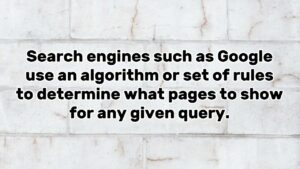
Looking to expand your marketing capabilities? Then you should know what are the benefits and challenges of going in-house vs outsourcing marketing. Some companies have been working on moving their marketing teams in-house especially as the pandemic wears on, but others prefer to focus on their core functions and hire an external agency instead. The question is, what is right for you and your company?
What is in-house marketing?
In-house marketing is exactly what it sounds like—having a marketing team that is internal to the company. For example, here in SEO Hacker we have our own marketing team that is in charge of promoting the company, so we don’t have to hire an external agency to do the marketing for us.
According to The Drum, 57% of multinational companies have created in-house marketing departments, with an additional 17% considering building one. The pandemic has also accelerated the creation of these departments as companies want to be more cost-effective and practical, especially since companies are trying to be more frugal in their expenses.
Benefits of in-house vs outsourcing marketing
Companies would not be hurrying to build an in-house marketing team if there were no benefits. Here are some of them.
Potentially lower costs for the company
I’m going to be mentioning costs quite a bit in this article, and that’s really because the idea of lower or higher costs depends a lot on a number of factors. When looking at the benefits of in-house marketing, costs can be lower depending on two things: first is the skill set your team already has, and second is how willing you are to spend on building and managing a team of your own.
For example, if you have a small but strong marketing team right from the start, then that could be cost-effective. You can also opt to migrate some employees to a marketing role, but that is if the other teams can handle losing some team members. Then you also have to spend on training and resources for marketing.
If the total of those costs are lower than hiring an agency, then you can say that costs are lower with an in-house marketing team.
Stronger brand familiarity
Simple—your in-house marketing team is exposed to the day-to-day processes of your company, therefore they are more familiar with your brand. And since they are your employees, that means they also know your company philosophy and culture. You have the same (or at least, similar) work processes and they know the best approach for your company because they are embedded in the company.
Faster communication
There is no need to email or coordinate a meeting with an accounts manager because you literally can just walk over to their desks and they can walk over to yours. There is also less potential for miscommunication because the team already has an understanding of what the company wants.
For my company, we just use Slack to communicate with each other. Everyone is one message away.
More transparency and control
An in-house marketing team will be focused on your business only and considering how you already have a similar outlook and they have an in-depth understanding of your brand philosophy, then that translates to more control.
In terms of transparency, you get to really know how the marketing efforts are playing out as the team has more access to company data, therefore they have more transparent reports.
When you outsource marketing to another agency, they can only really give you the data that is showing up on their dashboards unless you will be providing them other numbers, such as your revenue.
Challenges of in-house vs outsourcing marketing
Just like there are benefits, there are also challenges to going in-house vs outsourcing marketing.
More work for the employees
First and foremost, especially if you have a limited budget for your marketing team, is that there is more work for your employees. Marketing is not a one-time or one-strategy thing; there are marketing plans to be made for different platforms, experiments, designs, executions, and monitoring.
For example, there is content marketing, email marketing, Pay-Per-Click, and SEO. These have different functions and need different strategies, and they have their own sets of skill sets that are integral to their success. For example, I update our SEO Hacker blog every Tuesday. I also have a podcast that has its dedicated team of producers, editors, and developers. My subscribers get updated every Monday through email. I also have my personal blog. Lastly, we have a retargeting and remarketing practice to ensure that our leads come back to our website.
So if you’re considering fully moving your marketing in-house, you need to look at the workload for those digital marketing strategies and figure out a way to balance them while ensuring your company is being cost-effective.
Limited skill set
With a limited budget comes a limited skill set. Unless you’re the kind of company owner who has no issues with overworking your team, then you won’t have the same skill set that outsourcing marketing to another agency will get you.
Lack of resources
Another challenge that your company could potentially have is the lack of resources, especially if you can’t afford multiple marketing experts and the tools that are needed for effective marketing.
Marketing is not as simple as creating a graphic and coming up with witty one-liners to catch your audience’s attention. It involves market research, keyword research, and a whole lot of strategizing. These strategies are based on data and not just solely on gut feeling. So if you have no way of getting data and monitoring your results, then effective marketing will be difficult to achieve.
Needing new employees
I sound like a broken record at this point, but marketing truly is an investment, and it’s one you shouldn’t skimp on. At some point, hiring and training new experts will be the investment you need to make. That said, going in-house vs outsourcing marketing can end up becoming more expensive for some companies as they end up hiring more people.
What is outsourced marketing?
Outsourced marketing is the exact opposite of in-house marketing. According to Hinge, outsourced marketing is the practice of partnering with an external agency for the company’s marketing needs.
Benefits of outsourced marketing vs in-house
Just as there are benefits to having an in-house team, there are also benefits to hiring an agency.
Companies can focus their resources on core functions
If you aren’t a marketing agency—let’s say, you’re in the construction business—and you’re thinking of having an in-house marketing team, that means you will have to budget your resources on functions that are outside of your business.
When you outsource your marketing, especially if you find a good partner, you get to just focus on whatever your company really does as the marketing portion can be entrusted to someone else.
That is also why in finding an agency, it’s integral that you know how to find a good one.
Access to a specialized team
One of the best things about outsourcing your marketing instead of building one in-house is that you get access to a team of experts at potentially a fraction of the cost. As I mentioned earlier, marketing isn’t a one-time thing. And it certainly isn’t a one-person endeavor.
Hiring an agency means you get writers, developers, designers, and researchers—basically, an entire team of people who live and breathe marketing—to do the work for you while you focus on other things. For example, here’s our team.
More resources for lower costs
Like I said earlier, I will be mentioning costs a couple of times in this post. As you get an entire team when you hire an agency, you also get their resources to be used for your benefit.
Now, some will say that hiring an agency is expensive. It really depends on how you see it and if you do have a workable budget. For example, our SEO services package costs $2,500 to $5,500 per month, with a 12 months lock-in. Yes, that is expensive, but take a look at what’s in the package:
- Site analysis
- Keyword research
- Blog setup
- Quality SEO copywriting
- Link building
- On-page optimization
- Paid directory listing
- Google Analytics reports
- Guest posting
- Monthly reports
And those are just the headers. For example, check out the “Quality SEO copywriting header.”

Here is the “On-page optimization” header:

As you can see, they involve a lot of work, and they involve their own tools and resources to be done right as well. So, yes, it seems expensive, but that’s because there’s an entire team composed of people with various specialties that is working for you.
Imagine if you have to hire people to do all these things, especially if the core function of your business is far from marketing.
Reduced risks
When you outsource marketing to a reputable agency, you ensure that your marketing is taken care of well. The team they assign to you will work hard to ensure that you aren’t wasting the money you’re spending on them on risky endeavors because everything is well-researched. And in the event that they will need to do some experimentation, the results of those experiments are well-documented so they know what’s working and what isn’t.
Challenges of outsourcing marketing vs in-house
There are a couple of challenges that need to be considered when outsourcing marketing vs going in-house.
Communication can potentially be tricky
In this case, the marketing team won’t be a desk or a chat away. They’re completely in a different company, so meetings will definitely need to be scheduled and coordinated. The agency can try to offset this challenge by assigning an accounts manager to your company whom you can contact whenever you have concerns.
Sometimes miscommunication can still happen, but that is why it’s incredibly important to be open and to just overcommunicate instead of expecting that both parties already understand the expectations and concerns of the partner.
Difference in company values
Another challenge that a company can have is looking for an agency that has similar values as they do. You wouldn’t want to end up hiring a company that believes in employing shady tactics or doesn’t believe in transparency.
That’s why when looking for an agency, make sure you check what their current and previous clients have to say about them. Do they take unnecessary risks? Were they difficult to communicate with? Do they see their clients as mere clients, or as partners? It’s important that you and your agency are a good fit for each other so that you can work together smoothly.
It can be expensive if you don’t have the budget
Again, we go back to budget concerns. As I mentioned earlier, outsourcing marketing can be a bit expensive, but that’s because there is plenty of work that comes with marketing. If you don’t have the budget, you can opt to go in-house and start your marketing on a smaller scale.
One thing that some companies do is to work on a hybrid setup. For example, a full digital marketing package from SEO Hacker costs around $3,500 to $9,900. Some of our partners decide to go with our SEO package, or even our email sales automation package which costs around $1,000 to $3,000. They outsource that work to us and work on their own marketing which they have a team for, and we coordinate our efforts to make sure we’re aligned.
For companies that don’t exactly have the budget for a full outsourcing or a full in-house team, a hybrid setup is the perfect solution.
For example, here are our clients, and plenty of them have a hybrid setup with us:

Less access to the team
Unlike if you have an in-house marketing team, you only really get to communicate with the accounts manager assigned to you when you decide to outsource your marketing. In an in-house setup, you get to speak with everybody, but that isn’t possible with an agency unless you specifically request to do so.
Key takeaway
So, should you go for in-house vs outsourcing marketing to another agency? The question here is, as always, what does your company need? And can you afford it?
Whether you build your team in-house or outsource your marketing, there will be a set of benefits and challenges. It could be too expensive, or new employees could be difficult to train. There could be more risks involved or a potential for miscommunication. Or you could find that either one is more cost-effective and practical for you in the long run.
And for those who don’t have the resources to go fully in-house or outsourced, a hybrid setup can be the way to go. It’s the best of both worlds for some, although it could have its own challenges such as coordination and alignment. But at least, that option is available.
Do you think going in-house vs outsourcing marketing is the way to go? Or is it vice-versa, or even both? Let me know in the comments what you think!







